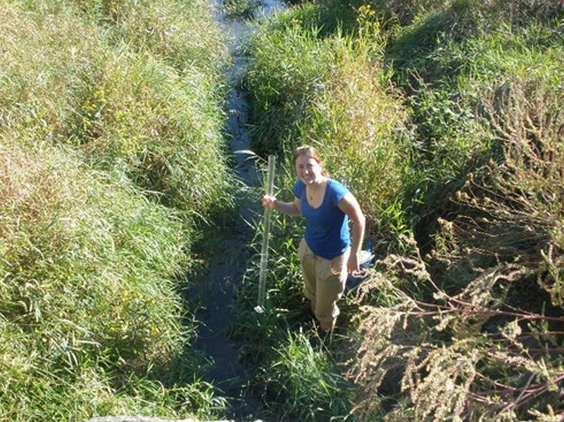
In 1970 Norman E. Borlaug was awarded the Nobel Peace Prize for a lifetime of work to feed a hungry world. Dr. Borlaug’s research in new disease-resistant wheat varieties and improved crop management practices transformed agricultural production in Mexico during the 1940’s and 1950’s and later in Asia and Latin America, sparking the “Green Revolution.” Today an extraordinary fellowship program dedicated in his name, the U.S. Borlaug Fellows in Global Food Security Program, offers young leaders the opportunity to follow in Dr. Borlaug’s footsteps. Based at Purdue University’s Center for Global Food Security, the fellows program offers graduate and doctoral students the opportunity to spend up to two years abroad conducting field research in a developing country with food security challenges, particularly Feed the Future countries. The program seeks young leaders with a strong science background and a well-designed research plan. One such leader is Caitlin Grady, a doctoral student at Purdue studying water treatment techniques around the Upper Nile River in East Africa and the Mekong River Basin in Southeast Asia. We asked Caitlin more about her experience applying to this competitive program and the benefits of being a fellow.
1. What inspired you to apply for the U.S. Borlaug Graduate Research Fellowship in Global Food Security?
As an undergraduate, I became involved in water treatment research in developing countries but since finishing my Masters and beginning my PhD, I have broadened my research to water and food-related development projects throughout the world since they are so intertwined. Specifically, I am interested in evaluating projects that have been previously implemented in order to study factors of success and failure of development. Many times development projects fail to be sustained for use in a particular community so it is imperative that we continue to monitor and evaluate projects post-implementation in order to continue improving and learn from the past. I was attracted to the Borlaug Fellowship it because it brings together a cohort of graduate students who are all working on different and very interesting topics under the umbrella of food security. The Borlaug Fellowship allows you to do field research for up to two years in a country of your choosing and connect with other fellows throughout the world. It is these opportunities that led me to apply.
2. What are some of the benefits to being a Borlaug Fellow?
Well obviously funding is a huge benefit! In my case, it allowed me to design my PhD from scratch on a topic of my choosing. In addition, finding funding to support a completely international research project is quite difficult but luckily this program provides just the outlet. In order to be funded, you also have to present strong mentoring relationships in your application (both for an academic advisor at your university and a mentor in-country). This structure provides immediate help and guidance throughout the research project, which helps you prepare the most meaningful and scientifically rigorous research possible. Since being awarded the fellowship, I also had the opportunity to meet other fellows using networking tools like our LinkedIn and Facebook groups, which the funding agency manages for all of the fellows. This has been extremely helpful to connect to other graduate students working in my part of the world (Southeast Asia)! The other great benefit is that once you win the fellowship, the funds are yours and are extremely flexible. I can use the grant for purchasing research supplies or for travel and living costs in country, or both! This program has already provided significant benefits and will continue to do so in the years to come.
3. What tips would you give others applying to the fellowship?
I have several suggestions for people applying: first, be sure your research relates specifically to food security. This program has funded projects in a wide variety of disciplines including topics in agronomy, agriculture engineering, health, political science, water treatment, engineering and anthropology, among many others. It may not seem like these disciplines have obvious links but they are funded because the research proposals have a clear focus and impact on food security challenges. Second, in your leadership statement, shoot for the moon when describing your aspirations and career goals – how do you want to make a difference in the world? They want to support future leaders both domestically and internationally. Finally, if you are not sure if you should apply, they also have a program called the Summer Institute for Global Food Security which is a two week program every year that includes seminars, field trips and projects. It can provide you a great baseline of getting into the food security world and discussing with the staff your opportunities to apply for the fellowship program. Good luck!
Caitlin Grady is a graduate student in the Ecological Sciences and Engineering Program at Purdue University. She received her Bachelors at Virginia Tech and Masters at Purdue and is now pursuing her PhD. Her studies focus on post-implementation research of water management development projects. She has performed research throughout Central America, the Middle East, East Africa, and currently Southeast Asia. Caitlin is also a National Science Foundation Graduate Research Fellow.
© Victoria Johnson 2013, all rights reserved